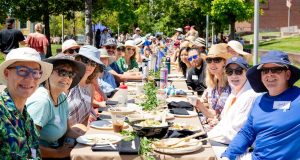Prepare (This section is preparation for the leader, not content meant for the whole group.)
Narrative context helps shed light on this parable. In the short passage between last week’s parable and this one, we learn that the Pharisees are among Jesus’ primary audience (Luke 16:14). The problem Jesus addresses here is the love of money.
In the larger narrative, Jesus has been telling stories about great reversals. In chapter 14, he teaches that when throwing a party, we should not invite those who can repay the favor. Then in chapter 15, we hear three parables about how, against all odds, the lost are found. Finally in chapter 16, we encounter the tangled story of a shrewd manager who is seemingly praised for his dishonest use of money and power. Today’s parable belongs in that same category of great reversals.
Some readers may feel discomfort with the portrayal of heaven and hell in this story. It is important, however, not to resolve that discomfort too quickly. As Lutherans, we may be tempted to jump immediately to the reminder that we are saved by grace and not by works. This parable does not challenge that central belief. But it does urge readers to pause, remember the witness of Scripture—“Moses and the prophets”—and to “listen to them” (Luke 16:29).
Finally, the use of the name “Lazarus” is significant. He is the only character Jesus ever names in a parable. This is not the same Lazarus whom Jesus raised from the dead. Since this parable is not referring to an actual person, there must be a reason Jesus chose the name. Lazarus is the Greek version of the Hebrew name Eliezer, which means “God has helped” or “God is my help.” Your group might consider whether this name is fitting or ironic.
Opening Exercise:
Think of a time when you encountered someone asking for money, help, or who was clearly in need. How did you respond? How did you feel about your response afterward? What might you do differently next time? Is there something you wish you could have done, but couldn’t?
Text Read Aloud:
Living as the Rich Man’s Brothers
A common way to approach a parable is to try to identify who represents whom in the story. For
example, readers often look for the God figure or the hero on one side, and someone opposing God as
a kind of foil on the other. This approach can help peel back the densely packed layers of Jesus’ teachings—but it can also lead us astray, like when we mistakenly identify a cruel king or landowner as the God figure.
The story of the rich man and Lazarus offers multiple points of entry for readers. Some might identify with the rich man, while others might identify with Lazarus. These two perspectives lead to very different reactions. Those who see themselves in the rich man may feel indicted, fearful, or guilty. Those who identify with Lazarus may feel comforted or justified. Yet, these are not the only options. There is a third character we might see ourselves in: the rich man’s brothers (Luke 16:28).
The brothers represent many of us, or at least many in our churches. Consider how many people know the teachings of Moses, the prophets (Luke 16:29), and Jesus, but do not follow them. How many people know what is being asked of them in order to be faithful but are not willing to do it? Or how many know that they are not going the right way but refuse to turn around and repent? And how many of us are looking at one of the brothers when we look in the mirror?
This raises a deeper question: what would it take for us to truly repent? Are the teachings of Jesus alone not enough? What if someone returned from heaven or hell to warn us? Would we change then? What about a mountain-top experience, a mission trip, or a close call? Would any of these experiences transform our hearts for good? What does your own faith story reveal?
This story is not meant to leave us feeling hopeless, as if repentance or salvation is impossible. Rather, it calls us to recognize that we already have what we need to live a holy life based on Scripture. The unspoken truth, however, is that we cannot guilt or hustle ourselves into perfect righteousness. We will always need Jesus in order to be made right with God and our neighbors. And this trust in God does not come from being intellectually “convinced” (Luke 16:31); it is a gift, freely given.
Reflection Questions
- Who are the key characters in this parable, and what does each one do or experience?
- Why do you think Jesus chose to name Lazarus and not the rich man? What does this detail reveal about God’s care or justice, if anything?
- What is the significance of the brothers in the story? How might they represent people in our communities today?
- Consider your own faith journey: how might this parable challenge you to notice where you are acting like the rich man, Lazarus, or the brothers—and what might you do differently as a result?
Closing Activity
Two options for this week!
- One-Word Reflection: Invite each participant to share one word that captures what they are taking away from the story of the rich man, Lazarus, and the brothers. After everyone shares, briefly reflect as a group on patterns or themes that emerged. This helps reinforce the main idea and gives everyone a chance to articulate their personal response in a concise, meaningful way.
- Guided Breath Prayer: Lead the group in a short breath prayer focused on repentance and trust in God. Guide the group by saying, “breathe in” and “breathe out”. Invite them to follow this pattern:
Inhale slowly, silently saying: “Create in me a clean heart”
Exhale slowly, silently saying: “Renew my spirit, O God”
Repeat for 5–7 breaths. Encourage participants to notice where they feel tension, guilt, or longing, and offer these up to God in the rhythm of their breath.
Afterward, allow a few moments for silent reflection or journaling on how God might be calling them to repent or to share the teachings of Jesus with those who need to hear them.
Final Blessing
Read this blessing, written by Kate Bowler*. It helps us name what is broken, reflect on what is ours to restore, and ask God to guide our actions with courage and hope. As you end your time together, invite the group to breathe, reflect, and here this prayer:
“Oh God, I am done with broken systems
that break the very people
they are meant to serve.
Harness this anger.
Channel it into worthy action and show me
what is mine to fix and what boundaries to patrol
to keep goodness in and evil out.
Blessed are we who are appalled
that brute ignorance can so easily dominate
over decency, honesty, and integrity.
Blessed are we, who choose not to look away
from systems that dehumanize, deceive, defame, and distort.
We who recognize that thoughts and prayers are not enough.
We who stand with truth over expediency,
principle over politics,
community over competition.
Oh God, how blessed are we who cry out to you:
empower us to see and name what is broken,
what is ours to restore,
guide us to find coherent and beautiful alternatives
that foster life, hope, and peace.
Help us use our gifts with one another in unity.
Blessed are we who choose to live in anticipation,
our eyes scanning the horizon,
for signs of your kingdom—
heaven-come-down—
as we wait in hope
and act with courage.”
*Bowler, Kate. A Blessing for When You’re Tired of Broken Systems. Kate Bowler, 2023. https://katebowler.com/blessings/a-blessing-for-when-youre-tired-of-broken-systems-2/
Bio of author
Sami Johnson is a pastor in the ELCA and has been ordained for 11 years. She is also a military spouse to a Navy Chaplain and currently on leave from call, caring for her family while her spouse is stationed in Key West, FL. Sami loves practicing hand embroidery, especially making ridiculously detailed felt applique Christmas stockings for her whole family.





